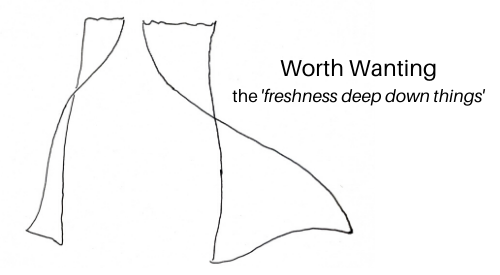
The word telos meaning purpose or goal has no place in scientific explanation, but we know we are telic beings, driven as we are, day by day and life-long, by aims, targets, goals, missions, and projects toward the attainment of things we value.
Encounters are how we find what’s worth wanting for the lives we lead. Can encountering also help us find what’s worth wanting for the worlds we live in?
More generally this question asks whether encountering is a practice with only private benefits on a purely personal scale, or may it also have public impact on a national or global platform scale? Let’s consider.
Any world worth wanting must strive to provide for the fundamental human needs of each of us as individuals and members of communities: survival, comfort, dignity. Encountering is about making common cause with the livingness of others in modes of hospitality, friendship and exploration. The virtues associated with these include generosity, steadfastness, courage. Multiple individuals encountering others near and far in these stances of solidarity create networks of positivity that positively impact the social environment.
Consider also, we are not just individuals but also members of kin groups, neighborhoods, organizations, institutions and traditions (KNOITs). When we encounter others who are fellow members, part of the caring we share is about our responsibilities in and for our common KNOIT with regard to mission and internal workings. For example, I talked this week on a walk about upcoming elections in our ward committee, our concern being fair but effective process. KNOITs are the levers of world-scale change; encounters can inform the hands that work those levers.
It’s also the case that we encounter many others we don’t share many or any memberships with, yet part of our making common cause may have to do with considering how our respective NOITs impact each other.
The term other in encountering applies to not just to those with whom we have little in common but also those with whom we have much. Otherness is not a matter of degree; a family member can be much an other as any member of a different species. All others have a claim on existence as good as our own.
There are other ways encountering can have impact on a public platform scale. When I say platform I’m talking about a space where people can pursue their various agendas. The interstate highway is public platform, and Google is a private, for instance. The Constitution provides governance for the platform which is the nation. A city can be thought of a platform, and the term civilization acknowledges this.
Civilizations depend for their dynamism on general agendas arising from the basic motives. These agendas assign value explicitly to profit, power and perpetuation which are genuine values, but not absolute ones. Performance, achievement and maintenance are important for any world to work well, especially one as complex as ours, but if only in balance with each other, and if basic human needs are provided for and the environmental platform is preserved. Lives and worlds worth wanting make provision for the pursuit of encounters so that people may regularly refresh that sense of transcendent value by which to critique and correct their platforms.
For encounters do have absolute value. They are good and sufficient in and of themselves. As portals to transcendent freshness, they inspire the imagination by which we can envision how our platform should be governed so as to promote human thriving indefinitely. Also, they inspire and train the courage, the generosity and steadfastness we need to realize any world we deem worth wanting.
The telos of a good life might be more encounters with more types of others in more ways more fully. Why cannot this be the telos of the world?
